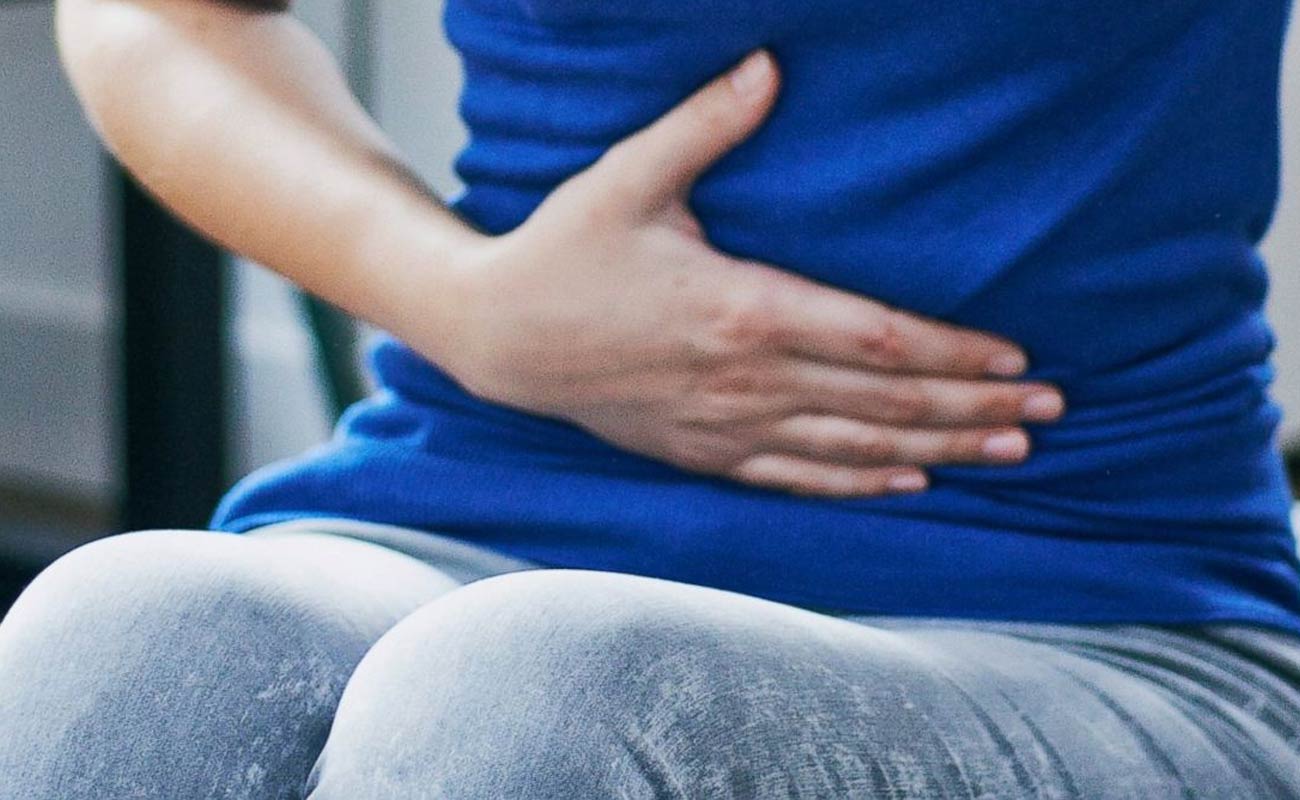IBS Symptoms
Irritable bowel syndrome (IBS) symptoms run the gamut of unpleasant intestinal symptoms—diarrhea, constipation, abdominal pain, gas, and bloating. Yes, these are all symptoms that most people experience at one time or another. It is when they happen to a person on a continual basis that there becomes the possibility that a person has IBS.

The most common symptoms of irritable bowel syndrome (IBS) include pain or discomfort in your abdomen and changes in how often you have bowel movements or how your stools look. The pain or discomfort of IBS may feel like cramping and have at least two of the following:
- Your pain or discomfort improves after a bowel movement.
- You notice a change in how often you have a bowel movement.
- You notice a change in the way your stools look.
IBS is a chronic disorder, meaning it lasts a long time, often years. However, the symptoms may come and go. You may have IBS if:
- You’ve had symptoms at least three times a month for the past 3 months.
- Your symptoms first started at least 6 months ago.
People with IBS may have diarrhea, constipation, or both. Some people with IBS have only diarrhea or only constipation. Some people have symptoms of both or have diarrhea sometimes and constipation other times. People often have symptoms soon after eating a meal.
Other symptoms of IBS are
- bloating
- the feeling that you haven’t finished a bowel movement
- whitish mucus in your stool
Women with IBS often have more symptoms during their menstrual periods.
While IBS can be painful, IBS doesn’t lead to other health problems or damage your gastrointestinal (GI) tract.
Causes

It's not known exactly what causes irritable bowel syndrome, but a variety of factors play a role. The walls of the intestines are lined with layers of muscle that contract and relax in a coordinated rhythm as they move food from your stomach through your intestinal tract to your rectum. If you have irritable bowel syndrome, the contractions may be stronger and last longer than normal, causing gas, bloating and diarrhea. Or the opposite may occur, with weak intestinal contractions slowing food passage and leading to hard, dry stools.
Abnormalities in your gastrointestinal nervous system also may play a role, causing you to experience greater than normal discomfort when your abdomen stretches from gas or stool. Poorly coordinated signals between the brain and the intestines can make your body overreact to the changes that normally occur in the digestive process. This overreaction can cause pain, diarrhea or constipation.
Triggers vary from person to person
Stimuli that don't bother other people can trigger symptoms in people with IBS — but not all people with the condition react to the same stimuli. Common triggers include:
- Foods. The role of food allergy or intolerance in irritable bowel syndrome is not yet clearly understood, but many people have more severe symptoms when they eat certain things. A wide range of foods has been implicated — chocolate, spices, fats, fruits, beans, cabbage, cauliflower, broccoli, milk, carbonated beverages and alcohol to name a few.
- Stress. Most people with IBS find that their signs and symptoms are worse or more frequent during periods of increased stress, such as finals week or the first weeks on a new job. But while stress may aggravate symptoms, it doesn't cause them.
- Hormones. Because women are twice as likely to have IBS, researchers believe that hormonal changes play a role in this condition. Many women find that signs and symptoms are worse during or around their menstrual periods.
- Other illnesses. Sometimes another illness, such as an acute episode of infectious diarrhea (gastroenteritis) or too many bacteria in the intestines (bacterial overgrowth), can trigger IBS.
Risk Factors
Irritable bowel syndrome is twice as common in women. Genetics (heredity) may play a role in IBS, but this is not yet known.
In some cases, IBS symptoms are triggered by the following:
- Eating habits—certain foods and beverages (e.g., chocolate, milk, alcohol, and soda), large meals, and some medications can aggravate IBS symptoms. Fats and caffeine sometimes can cause intestinal cramping.
- Smoking—Nicotine in cigarettes can worsen symptoms in some patients.
- Stress—Symptoms may be more severe during times of stress.
Diagnosis
A doctor will get a medical history and perform a physical exam, looking for "alarm" symptoms like fever, bleeding, or drastic weight loss that could be due to something more serious.
X-rays or lower gastrointestinal endoscopy (using a tube with a tiny camera on the end) may be used to look inside the colon, especially for older individuals. Sometimes, abdominal ultrasounds or X-rays of the intestines are done.
Treatment

Though irritable bowel syndrome (IBS) doesn’t have a cure, your doctor can manage the symptoms with a combination of diet, medicines, probiotics, and therapies for mental health problems. You may have to try a few treatments to see what works best for you. Your doctor can help you find the right treatment plan.
Changes in eating, diet, and nutrition
Changes in eating, diet, and nutrition, such as following a FODMAP diet, can help treat your symptoms.
Medicines
Your doctor may recommend medicine to relieve your symptoms.
- Fiber supplements to relieve constipation when increasing fiber in your diet doesn’t help.
- Laxatives to help with constipation. Laxatives work in different ways, and your doctor can recommend a laxative that’s right for you.
- Loperamide to reduce diarrhea by slowing the movement of stool through your colon. Loperamide is an antidiarrheal that reduces diarrhea in people with IBS, though it doesn’t reduce pain, bloating, or other symptoms.
- Antispasmodics, such as hyoscine, cimetropium, and pinaverium, help to control colon muscle spasms and reduce pain in your abdomen.
- Antidepressants, such as low doses of tricyclic antidepressants and selective serotonin reuptake inhibitors, to relieve IBS symptoms, including abdominal pain. In theory, because of their effect on colon transit, tricyclic antidepressants should be better for people with IBS with diarrhea, or IBS-D, and selective serotonin reuptake inhibitors should be better for people with IBS with constipation, or IBS-C, although studies haven’t confirmed this theory. Tricyclic antidepressants work in people with IBS by reducing their sensitivity to pain in the gastrointestinal (GI) tract as well as normalizing their GI motility and secretion.
- Lubiprostone (Amitiza) for people who have IBS-C to improve abdominal pain or discomfort and constipation symptoms.
- Linaclotide (Linzess) for people who have IBS-C to relieve abdominal pain and increase how often you have bowel movements.
- The antibiotic rifaximin to reduce bloating by treating small intestinal bacterial overgrowth. However, experts are still debating and researching the use of antibiotics to treat IBS.
- Coated peppermint oil capsules to reduce IBS symptoms.
Follow your doctor’s instructions when you use medicine to treat IBS. Talk with your doctor about possible side effects and what to do if you have them.
Some medicines can cause side effects. Ask your doctor and your pharmacist about side effects before taking any medicine. MedlinePlus maintains the latest information about side effects and drug warnings.
Probiotics
Your doctor may also recommend probiotics. Probiotics are live microorganisms—tiny organisms that can be seen only with a microscope. These microorganisms, most often bacteria, are like the microorganisms that are normally present in your GI tract. Studies have found that taking large enough amounts of probiotics, specifically Bifidobacteria and certain probiotic combinations, can improve symptoms of IBS. However, researchers are still studying the use of probiotics to treat IBS.
You can find probiotics in dietary supplements, such as capsules, tablets, and powders, and in some foods, such as yogurt.
Discuss your use of complementary and alternative medical practices, including probiotics and dietary supplements, with your doctor.
Therapies for mental health problems
Psychological therapies may improve your IBS symptoms.
Managing Stress
Learning to reduce stress can help improve IBS. With less stress, you may find you have less cramping and pain. You may also find it easier to manage your symptoms.
Some options for managing stress include
- taking part in stress reduction and relaxation therapies such as meditation
- getting counseling and support
- taking part in regular exercise such as walking or yoga
- reducing stressful life situations as much as possible
- getting enough sleep
Talk Therapy
Talk therapy may reduce stress and improve your IBS symptoms. Two types of talk therapy that health care professionals use to treat IBS are cognitive behavioral therapy and psychodynamic, or interpersonal, therapy. Cognitive behavioral therapy focuses on your thoughts and actions. Psychodynamic therapy focuses on how your emotions affect your IBS symptoms. This type of therapy often involves relaxation and stress management techniques.
Gut-Directed Hypnotherapy
In gut-directed hypnotherapy, a therapist uses hypnosis to help you relax the muscles in the colon.
Mindfulness Training
Mindfulness training can teach you to focus your attention on sensations occurring at the moment and to avoid catastrophizing, or worrying about the meaning of those sensations.
Prevention

Some physical as well as mental health problems can trigger IBS. The best way to prevent symptoms of IBS is avoiding the triggers. Diet and lifestyle modifications can go a long way in preventing the symptoms of IBS. The best way to keep the symptoms away is to avoid complex carbohydrates and pulses, smoking and alcohol.
- The fiber in your diet can help or worsen your condition depending on whether you have constipation or diarrhea. According to the National Institute of Health and Excellence (NICE) clinical guidelines, fiber intake for people with IBS should be adjusted according to the symptoms and its effects [3]. A diet containing low fiber can improve your symptoms of IBS significantly if a high carbohydrate diet increases your chances of bloating and flatulence. Eat more fruits, fiber-rich food and green leafy vegetables. If you have constipation, increase your fiber intake. But make sure to do it gradually as a sudden drastic change in dietary habits may make symptoms worse.
- It is a good idea to keep a food diary that can help you correlate the food you eat and your IBS symptoms. The most common trigger of IBS is food sensitivity. Therefore, in a majority of the cases, a change in eating habits may be suggested. Giving up milk and dairy products may help some people. Consider having probiotics as they have been shown to provide relief
- Avoid eating spicy foods and foods rich in fats. Spicy foods are likely to irritate sensitive bowel and worsen the symptom of diarrhea. Fatty foods not only worsen IBS symptoms but are also bad for your overall health.
- Avoid other foods and drinks like coffee, tea, etc. that you think might trigger the symptoms. As per NICE guidelines, a person suffering from IBS should restrict caffeinated beverages to three cups per day.
- Do not overeat. Control portion size. Divide your meals into smaller portions over the day. Do not eat at midnights.
- Follow a healthy lifestyle. Exercise regularly and sleep adequately. Avoid smoking and limit your alcohol intake.
References:
- Irritable bowel syndrome. The National Digestive Diseases Information Clearinghouse. http://www.digestive.niddk.nih.gov/ddiseases/pubs/ibs/. Accessed April 23, 2014.
- Camilleri M. Peripheral mechanisms in irritable bowel syndrome. New England Journal of Medicine. 2012;367:1626.
- Ferri FF. Ferri's Clinical Advisor 2014: 5 Books in 1. Philadelphia, Pa.: Mosby Elsevier; 2014. https://www.clinicalkey.com. Accessed April 23, 2014.
- Wald A. Diagnosis of irritable bowel syndrome. http://www.uptodate.com/home. Accessed April 23, 2014.
- Wald A. Pathophysiology of irritable bowel syndrome. http://www.uptodate.com/home. Accessed April 23, 2014.
- Wald A. Treatment of irritable bowel syndrome. http://www.uptodate.com/home. Accessed April 23, 2014.
- Rome III diagnostic criteria for functional gastrointestinal disorders. Rome Foundation. http://www.romecriteria.org/criteria/. Accessed April 23, 2014.
- Cristofori F, et al. Increased prevalence of celiac disease among pediatric patients with irritable bowel syndrome: A 6-year prospective cohort study. Journal of the American Medical Association Pediatrics. In press. Accessed May 5, 2014.
- Brandt LJ, et al. An evidence-based systematic review on the management of irritable bowel syndrome. American Journal of Gastroenterology. 2009;104(suppl):1.
- AskMayoExpert. IBS. Rochester, Minn.: Mayo Foundation for Medical Education and Research; 2014.
- Lakhan SE, et al. Mindfulness-based therapies in the treatment of somatization disorders: A systematic review and meta-analysis. PLoS One. 2013;8:e71834.
- Muir JG, et al.The low FODMAP diet for treatment of irritable bowel syndrome and other gastrointestinal disorders. Gastroenterology & Hepatology. 2013;9:450.
- Vazquez-Roque MI, et al. A controlled trial of gluten-free diet in patients with irritable bowel syndrome-diarrhea: Effects on bowel frequency and intestinal function. Gastroenterology. 2013;144:903.
- Hungin APS, et al. Systematic review: Probiotics in the management of lower gastrointestinal symptoms in clinical practice — an evidence-based international guide. Alimentary Pharmacology and Therapeutics. 2013;38:864.
- Relaxation techniques for health: An introduction. National Center for Complementary and Alternative Medicine. http://nccam.nih.gov/health/stress/relaxation.htm. Accessed May 6, 2014.
- Herbs at a glance: Peppermint oil. National Center for Complementary and Alternative Medicine. http://nccam.nih.gov/health/peppermintoil. Accessed May 6, 2014.
- Manheimer E, et al. Acupuncture for treatment of irritable bowel syndrome. Cochrane Database of Systematic Reviews. http://onlinelibrary.wiley.com/doi/10.1002/14651858.CD005111.pub3/abstract. Accessed May 18, 2014.
- Lindfors P, et al. Effects of gut-directed hypnotherapy on IBS in different clinical settings — results from two randomized, controlled trials. American Journal of Gastroenterology. 2012;107:276.
- McKenzie YA, et al. British Dietetic Association evidence-based guidelines for the dietary management of irritable bowel syndrome in adults. Journal of Human Nutrition and Dietetics. 2012:25;260.
- Chao G, et al. Effectiveness of acupuncture to treat irritable bowel syndrome: A meta-analysis. World Journal of Gastroenterology. 2014;20:1871.
- Rey E, et al. Chronic constipation, irritable bowel syndrome with constipation and constipation with pain/discomfort: Similarities and differences. American Journal of Gastroenterology. In press. Accessed March 4, 2014.
- Camilleri M. Current and future pharmacological treatments for diarrhea-predominant irritable bowel syndrome. Expert Opinion on Pharmacotherapy. 2013;14:1151.
- Golden AK. Decision Support System. Mayo Clinic, Rochester, Minn. April 24, 2014.
- U.S. News best hospitals 2013-2014. U.S. News & World Report. http://health.usnews.com/best-hospitals/rankings/gastroenterology-and-gi-surgery. Accessed April 24, 2014.
- Picco MF (expert opinion). Mayo Clinic, Jacksonville, Fla. May 14, 2014.
- Ottillinger B, et al. STW 5 (Iberogast) — A safe and effective standard in the treatment of functional gastrointestinal disorders. Wiener Medizinische Wochenschrift. 2013;163:65.
- Dai C, et al. Probiotics and irritable bowel syndrome. World Journal of Gastroenterology. 2013;19:5973.
- Sisson G, et al. Randomised clinical trial: A liquid multi-strain probiotic vs. placebo in the irritable bowel syndrome — a 12 week double-blind study. Alimentary Pharmacology and Therapeutics. In press. Accessed May 18, 2014.
- Bauer BA (expert opinion). May Clinic, Rochester, Minn. May 16, 2014.
- 1. Yang T-Y, Chen C-S, Lin C-L, Lin W-M, Kuo C-N, Kao C-H. Risk for Irritable Bowel Syndrome in Fibromyalgia Patients: A National Database Study. Zapata. E, ed. Medicine. 2015;94(10):e616. doi:10.1097/MD.0000000000000616.
- 2. Halder SL and colleagues. Influence of alcohol consumption on IBS and dyspepsia.
- 3. Irritable bowel syndrome and diet. National Health Service (NHS)- National Institute of Health and Excellence (NICE)
- 4. niddk.nih.gov, medbroadcast.com, nytimes.com, healthcommunities.com, mayoclinic.org, niddk.nih.gov, webmd.com,




Submit Comment